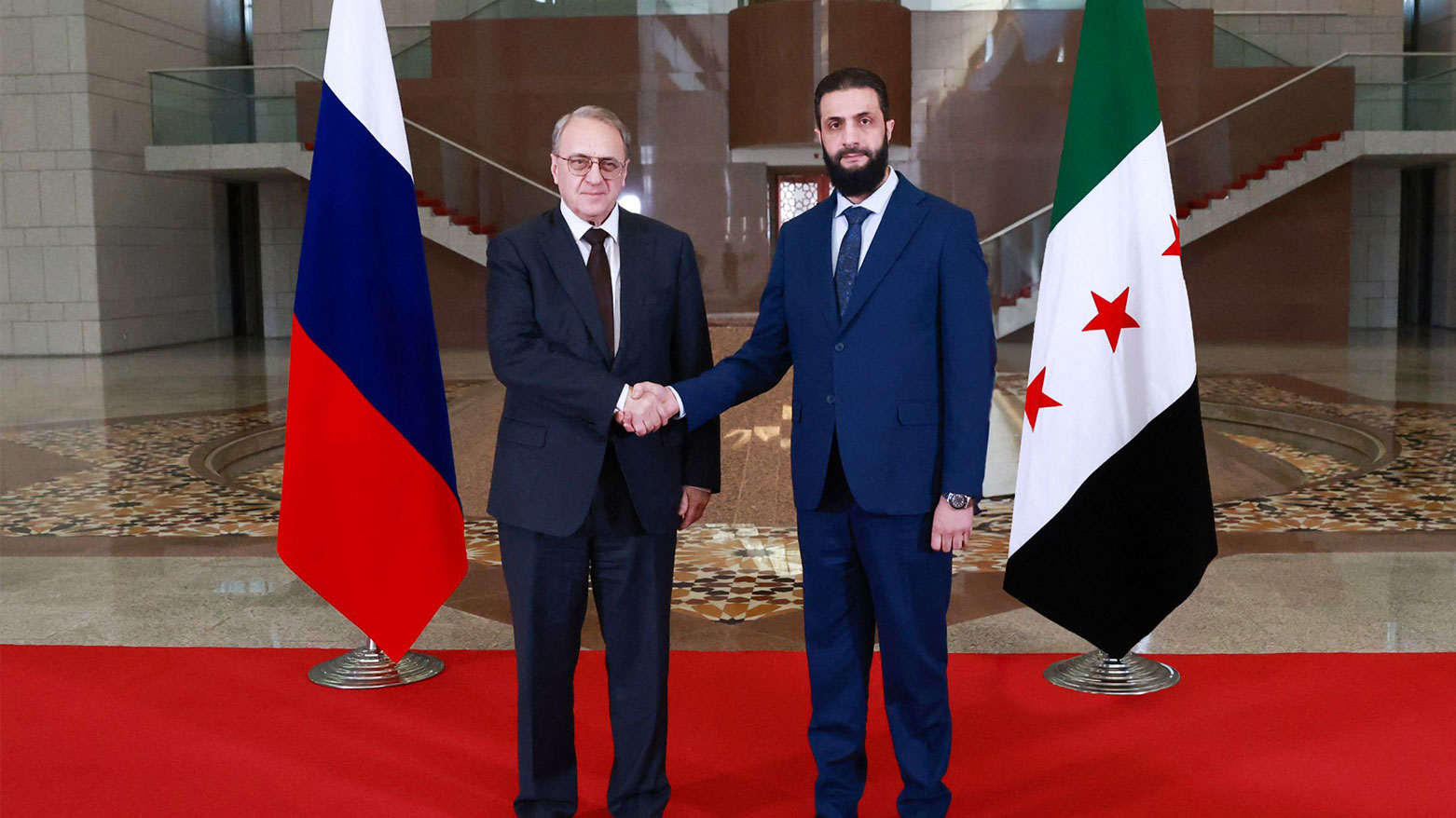Syria’s Al-Sharaa to Visit Moscow on Wednesday
Syrian Interim President Ahmed al-Sharaa will visit Moscow to discuss Russia's military bases and is expected to request the extradition of ousted Syrian President Bashar al-Assad. The trip underscores Moscow's enduring strategic commitment to the Syrian state beyond individual leaders.

Erbil (Kurdistan24) – Syrian Interim President Ahmed al-Sharaa is set to visit Moscow on Wednesday, state-run Syria TV reported on Tuesday, marking his first official visit to Russia since assuming office. The visit comes despite the postponement of an Arab summit initially scheduled to take place in the Russian capital, underscoring the continued depth of strategic coordination between Damascus and Moscow.
A Syrian official source confirmed to Syria TV that al-Sharaa will hold high-level talks with Russian leaders focused on the continued operation of Russia’s naval base in Tartous and Hmeimim Airbase in Latakia province — two key pillars of Moscow’s military presence on the Mediterranean coast. The source added that al-Sharaa is also expected to formally request the extradition of ousted Syrian President Bashar al-Assad, who fled the country following his ouster and was later granted political asylum in Russia, to stand trial for alleged crimes committed against Syrians during his rule.
According to the source, the extradition request is expected to be one of the most sensitive topics on the agenda, potentially testing the strength of the long-standing Syrian–Russian alliance. Moscow, which hosted Assad for years, has in recent months sought to preserve diplomatic and strategic ties with Syria’s new leadership, while offering continued military and political backing in the face of recurrent Israeli airstrikes on Syrian territory.
Al-Sharaa’s upcoming visit coincides with a major Russian military buildup along Syria’s western coast. According to the Syrian Observatory for Human Rights, over the past several days, nine massive Russian A124 transport aircraft have landed at Hmeimim Airbase, carrying heavy weaponry, logistical supplies, and advanced defense systems directly from Russia.
At the same time, four military convoys were seen departing from Russia’s Tartous naval base and heading toward Hmeimim, transporting dozens of military trucks, heavy equipment, and fuel tankers. Witnesses reported that the convoys moved in tight coordination along the coastal highway, indicating Moscow’s ongoing reinforcement of its strategic corridor connecting its naval and air facilities.
Observers say the pattern of activity represents one of Russia’s largest military resupply operations in Syria since early 2022. The continuous stream of heavy aircraft landings suggests that Moscow is not only replenishing its forces but also reasserting its long-term strategic dominance in the eastern Mediterranean.
Speaking to Kurdistan24, Vadim Makarenko, a researcher at the Institute of Oriental Studies of the Russian Academy of Sciences, emphasized that Russia’s presence in Syria is permanent and indispensable.
“Russia will remain in Syria — this is beyond any doubt,” Makarenko stated. “Every government or authority in Syria since 1947 has maintained relations with Russia. We have supported them all and defended Syria’s sovereignty. Our presence there serves our national interests — maritime dominance, aerial supremacy, and strategic access to the eastern Mediterranean.”
Makarenko stressed that Moscow’s engagement in Syria transcends personal or political affiliations. “We are not tied to individual leaders,” he explained. “Our objective is to maintain relations with the Syrian state itself. We hope the current Syrian government develops inclusive relations with all national components — Kurds, Druze, and others — to ensure that the Syrian Republic becomes a home for all its citizens.”
He dismissed notions of Russian hegemony in Syria, asserting that Moscow’s role is to preserve balance rather than impose control. “At this moment, Syria remains vulnerable — its air force and navy have been severely weakened, leaving it defenseless before regional powers such as Israel. That is why maintaining equilibrium is crucial, and Russia must help safeguard it,” Makarenko said.
Makarenko also underscored that Russia’s continued deployment in Syria is necessary to prevent internal collapse and maintain the country’s role as an active regional actor. “We are not against the presence of other powers,” he said. “We do not seek monopoly or dominance. Our aim is to contribute to the solution, not to impose it.”
He reiterated that Russia supports inclusive governance and recognizes the importance of Kurdish participation in Syria’s political future. “The Kurds must have their rights and a degree of regional autonomy,” Makarenko added. “Russia will assist Syria in developing an equitable structure where all communities — Kurds, Druze, Arabs — can coexist peacefully. This is not an impossible goal.”
According to Makarenko, Russia’s mission will not change despite growing tensions with Turkey, Israel, or the United States. “We are not leaving Syria because of external pressure. On the contrary, our presence is necessary precisely because those actors are there,” he explained. “Syria needs Russia — and the region needs balance.”
Sharaa’s Moscow trip takes place against a backdrop of rapidly shifting alliances in the Middle East. Following Türkiye’s rapprochement with Damascus and renewed U.S. engagement through its anti-ISIS framework, the Russian–Syrian partnership appears to be entering a new phase focused on institutional continuity and military entrenchment rather than ideological loyalty.
As massive cargo planes continue to land in Latakia and convoys move between Tartous and Hmeimim, analysts view the developments as part of Moscow’s broader determination to anchor its presence in Syria permanently.
“If Russia leaves Syria, it will be gone forever — and that cannot happen,” Makarenko told Kurdistan24. “We must stay to protect our interests, preserve balance, and contribute to a stable future for the Syrian state.”
Al-Sharaa’s impending discussions in Moscow — centered on the fate of the ousted president Assad, the status of Russian bases, and the future of bilateral cooperation — will not only test the resilience of Damascus–Moscow relations but could also define the next phase of Syria’s political transformation and Russia’s enduring footprint in the Middle East.